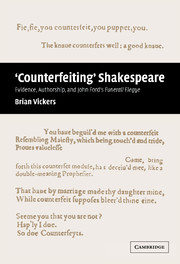Book contents
- Frontmatter
- Contents
- Preface
- List of tables
- List of abbreviations and note on references
- Prologue. Gary Taylor finds a poem
- PART I DONALD FOSTER'S ‘SHAKESPEAREAN’ CONSTRUCT
- PART II JOHN FORD'S ‘FUNERALL ELEGYE’
- 9 Ford's writing career: poet, moralist, playwright
- 10 Ford and the Elegye's ‘Shakespearean diction’
- 11 The Funerall Elegye in its Fordian context
- Epilogue. The politics of attribution
- APPENDICES
- Notes
- Bibliography
- Index
11 - The Funerall Elegye in its Fordian context
Published online by Cambridge University Press: 10 December 2009
- Frontmatter
- Contents
- Preface
- List of tables
- List of abbreviations and note on references
- Prologue. Gary Taylor finds a poem
- PART I DONALD FOSTER'S ‘SHAKESPEAREAN’ CONSTRUCT
- PART II JOHN FORD'S ‘FUNERALL ELEGYE’
- 9 Ford's writing career: poet, moralist, playwright
- 10 Ford and the Elegye's ‘Shakespearean diction’
- 11 The Funerall Elegye in its Fordian context
- Epilogue. The politics of attribution
- APPENDICES
- Notes
- Bibliography
- Index
Summary
The last stage in my argument that Ford, not Shakespeare, wrote the Funerall Elegye, will consist of citing, in one continuous sequence, more than eighty passages in that poem for which I have found parallels in Ford's poems, prose works, and plays. (Each passage is given a number, preceded by an asterisk: (*1) In compiling it I have kept in mind the standard objection that ‘parallel passages’ may prove nothing except accidental similarity, imitation, or the use of a common stock of language available to poets in any era, and I have adopted various strategies to avoid falling into these traps. I have deliberately not based my arguments on the occurrence of single words both in the Elegye and in Ford's work, except where it could be shown that such words never occur in Shakespeare, and that they involve rare words, or words used in an idiosyncratic way. Where I claim direct parallels between the Elegye and Ford's writings, it is always for larger units of discourse, collocations or phrases several words long, verbal sequences that also carry with them recurring trains of thought. As the preceding discussion will have shown, I have been investigating these thought-parallels in a way rarely, if ever, pursued in the statistic-based stylistics currently used in authorship studies, by attempting to re-create Ford's mental world or value-system, the synthesis that he, like many Renaissance thinkers, made between Christian and Stoic ethics.
- Type
- Chapter
- Information
- 'Counterfeiting' ShakespeareEvidence, Authorship and John Ford's Funerall Elegye, pp. 363 - 421Publisher: Cambridge University PressPrint publication year: 2002



